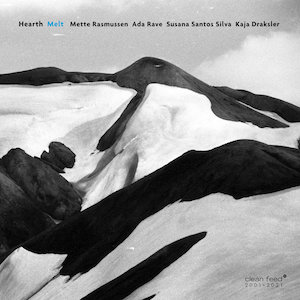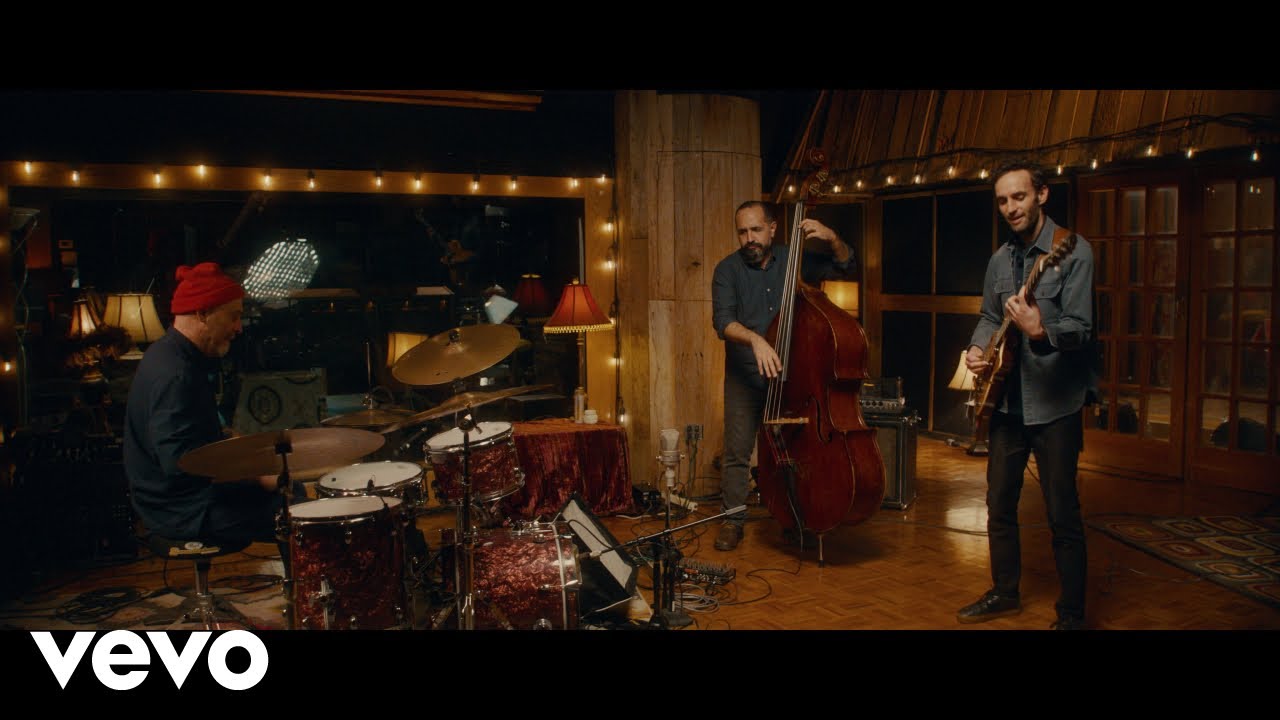Maria Grand by Adrien Tillman
Despite listening to jazz seriously for more than 35 years I’d never heard of the British pianist and composer Mike Taylor until Trio, Quartet & Composer Revisited crossed my path, and I’m sure glad the situation has been rectified. The troubled artist drowned himself in the Thames in 1969 at the age of 31, cutting short a wildly promising career that experienced realisation on Trio, his second and final studio recording, released by Columbia in 1967.
That effort occupies most of the space on this illuminating new reissue from ezz-thetics, capturing his adroit post-Bill Evans reflection alongside drummer Jon Hiseman and various combinations of bassists Ron Rubin and Jack Bruce, who form a simpatico low-end duo on three of the eight rapturous tunes, half of which Taylor wrote.
The performances are masterfully fine-tuned, temperate on the surface but roiled by friction in the way the musicians interact—deftly dragging the groove, adding subtle flashes of turbulence, and sharing in lyrical introspection. The CD is appended by a quartet reading of Dizzy Gillespie’s ‘A Night In Tunisia’, taken from the pianist’s debut album Pendulum issued a year earlier, and there’s also three tracks that he co-wrote with drummer Ginger Baker from Cream’s 1968 album Wheels On Fire, indicating Taylor’s curiosity and range.
Nicely complementing this CD is a new archival discovery from the good folks at Jazz In Britain entitled Mandala. The live quartet session, from January 8, 1965 from Studio Club, Westcliff-On-Sea, Southend, was taped by Hiseman on a reel-to-reel deck. Naturally, the fidelity isn’t ideal, but it’s certainly allows us to hear Taylor’s evolving talents.
The group, with soprano saxophonist Dave Tomlin and bassist Tony Reeves, is far more driving than the subsequent trio material, and the similarity of the live version of ‘Night In Tunisia’ with the studio one mentioned above suggests that Taylor’s real development was yet to come. Still, it’s a pleasing and valuable document
Tom Rainey Obbligato – Untucked In Hannover
(Intakt)
Drummer Tom Rainey loves standards, but he’s not interested in playing them straight. His quintet Obbligato applies a loosey-goosey touch to the familiar tunes in its repertoire, which means not only do the members engage in plenty of improvisation, but also that the arrangements themselves are largely spontaneous. This live date—with the wonderful Jacob Sacks subbing for Kris Davis, the band’s usual pianist—captures a spirited performance in Hannover in October of 2018 that celebrates classic jazz verities while colliding them with the sort of enveloping spontaneity that’s too often missing in contemporary jazz. The group insinuates the themes with feints and jabs, sometimes eschewing clear statements, while at other moments smudging the tunes with elongated phrases or out-of-sync motion. On a ravishing interpolation of “What’s New” and “There is No Greater Love” Sacks gingerly traces out the melodies and bassist Drew Gress whispers the changes while trumpeter Ralph Alessi and saxophonist Ingrid Laubrock dance around them, intimating and dissecting melodies in often improvised counterpoint. Rainey masterfully shepherds the entire process, swinging, making space, but keeping things in line.
Ben Goldberg – Everything Happens To Be.
(BAG Production)
On this fantastic new album veteran clarinetist Ben Goldberg also braids jazz tradition with contemporary language. Leading a wonderful quintet featuring tenor saxophonist Ellery Eskelin and the members of the working trio Thumbscrew (guitarist Mary Halvorson, bassist Michael Formanek, and drummer Tomas Fujiwara, who together have a serious rapport), he wrote a new batch of tunes, many of which employ chorale-like arrangements, with the two reedists and Halvorson articulating gorgeous contrapuntal melodies that evoke the heyday of cool jazz, particularly the genius of Jimmy Giuffre. While the players have all earned reputations for their expressiveness and recognisable sound on their given instruments, the real appeal is how they navigate the space carved out here, unspooling elaborate, elegant lines simultaneously without stepping on toes or tripping one another up. The delicate ‘Fred Hampton’ pays homage to the slain Black Panther with a tender serenity that speaks to his innate humanity, while the downhill momentum at the conclusion of ‘Cold Weather’ gloriously turns the swing-like cadences on their head.
Hearth – Melt
(Clean Feed)

This transcontinental quartet first played together at the 2016 October Meeting at the Bimhuis in Amsterdam, and there was an obvious spark onstage as well as in the audience — I was lucky enough to be there for it. Slovenian pianist Kaja Draksler, Portuguese trumpeter Susana Santos Silva, Argentine reedist Ada Rave, and Danish alto saxophonist Mette Rasmussen parlayed that curated appearance into a working project and Hearth’s first recording, made over several days at the Portalegre Jazz Festival in May of 2019 both in front of an audience and without one, proves their instincts right. The six pieces combine free improvisation and loose structural ideas introduced by individual members. Cumulatively they a achieve a bracing blend of spontaneity and compositional logic, with the braiding of in-and-out-of sync long tones on the piece ‘Tidal Phase’ producing an eerie hypnosis, with Draksler employing an e-bow to match the sustain of her partners. Other pieces embrace more interactive phrasing, whether it’s the collision of unpitched breaths on ‘At Daybreak’ — which features one of the members speaking the phrase, “Silence, too much talking,” critiquing a common enough problem in garrulous free jazz — or the episodic exchanges that fuel the peripatetic journey in ‘Diving Bells’.
Anna Webber – Idiom
(Pi)
With every new project New York composer and reedist Anna Webber raises the stakes in her music, and this fantastic new double attains a new peak. A few years back she began wondering why the extended techniques used by most improvising rarely turned up as compositional devices. She spent all of 2019 composing this music, conducting research and interviewing these collaborators about their favourite techniques. The first set of music was written for long-running Simple Trio with pianist Matt Mitchell and drummer John Hollenbeck, but whether you know multiphonics from histrionics isn’t necessary to feel the authority in her playing, and how her writing lifts her band to astonishing feats. The material is complex and knotty, but the performances are marked by a razor-sharp clarity that’s intoxicating. Disc 2 features a new 12-member band with several hardcore new music folks (cellist Mariel Roberts, violist Erica Dicker, and French horn player David Marrow-Byrd) in the company of protean improvisers like trombonist Jacob Garchik bassist Nick Dunston, and trumpeter Adam O’Farrill. Webber is so rigorous that any division between jazz and new music is destroyed, and the seven-movement work bristles with alien textures, neck-snapping rhythmic shifts, and, of course, top-flight improvisation. It all might be the most ambitious outing I’ve heard since she dropped Clockwise two years ago.
Jason Moran & Milford Graves – Live at Big Ears
(Yes)
The singular percussionist/ healer/ educator Milford Graves, who died in February at 79, was once part of an explosive duo with pianist Don Pullen and he returned briefly to the format for this sadly one-off performance with Jason Moran in 2018. Unlike so many of the musicians who jousted with Graves, Moran dialed back the intensity, offering the master a much different, less aggressive context that we normally heard him within. The results were astonishing, with a deep, multi-tiered connection that reveals the subtle tenderness and tuneful side of the drummer. The collection is bookended by a lovely pair of works Moran performed alongside a Graves sound installation that was part of the Mind-Body Deal Milford Graves exhibition in Philadelphia in November of 2020, but in between we experience a rare two-way magic that feels as profound as any benediction could possibly be.
Maria Grand – Reciprocity
(Biophilia)
As with many jazz musicians, tenor saxophonist Maria Grand sought to cram in a ton of ideas on her first album, obscuring her vision within the shape-shifting concepts packing her 2018 album Magdalena. She’s settled into her sound on her superb follow-up – Reciprocity, a lean, agile trio date with bassist Kanoa Mendenhall and drummer Savannah Harris featuring material the group played together in the months before the saxophonist gave birth to her first child. Apart from some bits of spoken word and sung melodies, which emanate from each piece with tender purpose, the new album focuses on the connection she’s formed with her limber ensemble, toggling between expansive, meditative, feverish, and luxuriant approaches to sound. On the opener ‘Creation, The Joy Of Being’, part of a seven-part suite she composed two months prior to the session, she clears out space for what follows, with lines that glide and dart. The subsequent movements are scattered among other original pieces, like the twitchy yet spacious ‘Whabri’, the slinky ‘Now, Take, Your Day’, where the whole band sings together, or the mantra-like ‘Fundamental Pt. 1’, a window into the saxophonist’s spiritual practice, which also turns up on a version of ‘Canto Manta’ by Venezuelan singer and healer Jesús Hidalgo.
Julian Lage – Squint
(Blue Note)
Guitarist Julian Lage was set to record his latest album following a weeklong engagement at the Village Vanguard in January of 2020, but, like so many things, the plan was upended by the pandemic. As the months elapsed he reconceived the effort to bring a healing light, and, when he reconvened with bassist Jorge Roeder and drummer Dave King last August he sought a different tone. These melodic jewels go down easy, but embedded within the lyrical beauty is an abiding sense of empathy and gentleness, with a classic jazz guitar trio sound spiked with rock flair and pop concision. The guitarist consistently weaves new melodic constellations, but even his improvisations are deeply entwined with the swinging grooves meted out by his nimble rhythm section. I don’t know how Squint will hold up in the longterm, but there’s no doubt it’s served as a welcome balm this year.
Elisabeth Coudoux’s Emiszatett – Earis
(Impakt)
Cellist and composer Elisabeth Coudoux and her group Emiszatett have found remarkable ways of blurring the lines between composition and improvisation. The dozen pieces she wrote for its new album Earis feel loose and elliptical. It’s conceivable that she developed loose frameworks that her partners fill spontaneously, but my sense is that these delicate miniatures are actually more mapped out, powered by her deep grasp of what her fellow musicians have developed in individual practices. The rustling that happens in ‘Captivates’, for example, possesses such a sense of shared purpose that I wouldn’t be surprised if they mapped out each of its 90 seconds. But in the end it doesn’t really matter, since each piece feels so sui generis, rapidly creating its own sound world before moving onto the next. Her Cologne band mates — trombonist Matthias Muche, bassist Robert Landfermann, keyboardist Philip Zoubek, and “extended snare” drummer Etienne Nillesen — are joined here by vocalist Pegelia Gold, who fits in beautifully with wordless fragments, swoops, and crackles, adding another tool to Coudoux’s bountiful toolbox. It’s worth giving it time to get under your skin.
Irène Schweizer & Hamid Drake – Celebration
(Intakt)
As she approaches her 80th birthday on 2 June, the brilliant Swiss pianist Irène Schweizer has largely retreated from live performance, but this riveting set with the redoubtable Chicago percussionist Hamid Drake from the 2019 edition to the Konfrontationen fest in Nickelsdorf proves her abilities are undiminished. The disc opens with an improvisation titled ‘A Former Dialogue’, in which the two musicians cyclically intuit one another’s every move, transforming feints into phrases with effortless elegance, while the subsequent eight pieces are credited to the pianist. Yet what makes Celebration such a treat is the duo is so telepathically attuned – drawing on encounters stretching back to 1995 — that its constant recalibration and elaboration of every gambit is accomplished with quicksilver fluidity and unified vision. ‘Song for Johnny — In Memory of Johnny Dyani’, is steeped in the pianist’s ongoing ardor for South African tradition first inspired by meetings with Dollar Brand and the Blue Notes in the mid-1960s, while elsewhere she threads together bits of post-bop, soul jazz, boogie woogie, and free jazz with total conviction and unimpeachable logic, carrying on her life-long rejection of any sort of restriction. This performance transmits as much freedom, energy, invention, and joy as anything I’ve heard all year.
Mario Pavone Dialect Trio + 1 – Blue Vertical
(Out of Your Head)

Bassist Mario Pavone was a crucial fixture on New York’s post-bop and free jazz scenes, a rhythmic monster that routinely attracted superb players in his bands. He died on 15 May at 80 following a long battle with cancer, but the disease didn’t diminish his wherewithal enough to arrange for this searing live date in late March, as he knew his life was winding down. Joined by pianist Matt Mitchell and drummer Tyshawn Sorey with special guest trumpeter Dave Ballou, he carried on with his work, using his full-bodied tone and unerring time to anchor muscular yet agile grooves and sturdy melodic schemes, nothing more, nothing less, as he lived his work for decades. His direct themes take hold and allow for copious exploration without ever relinquishing a buzzing energy and pulsing clarity. There’s something profound that his final statement was a simple affirmation of his life’s work.



